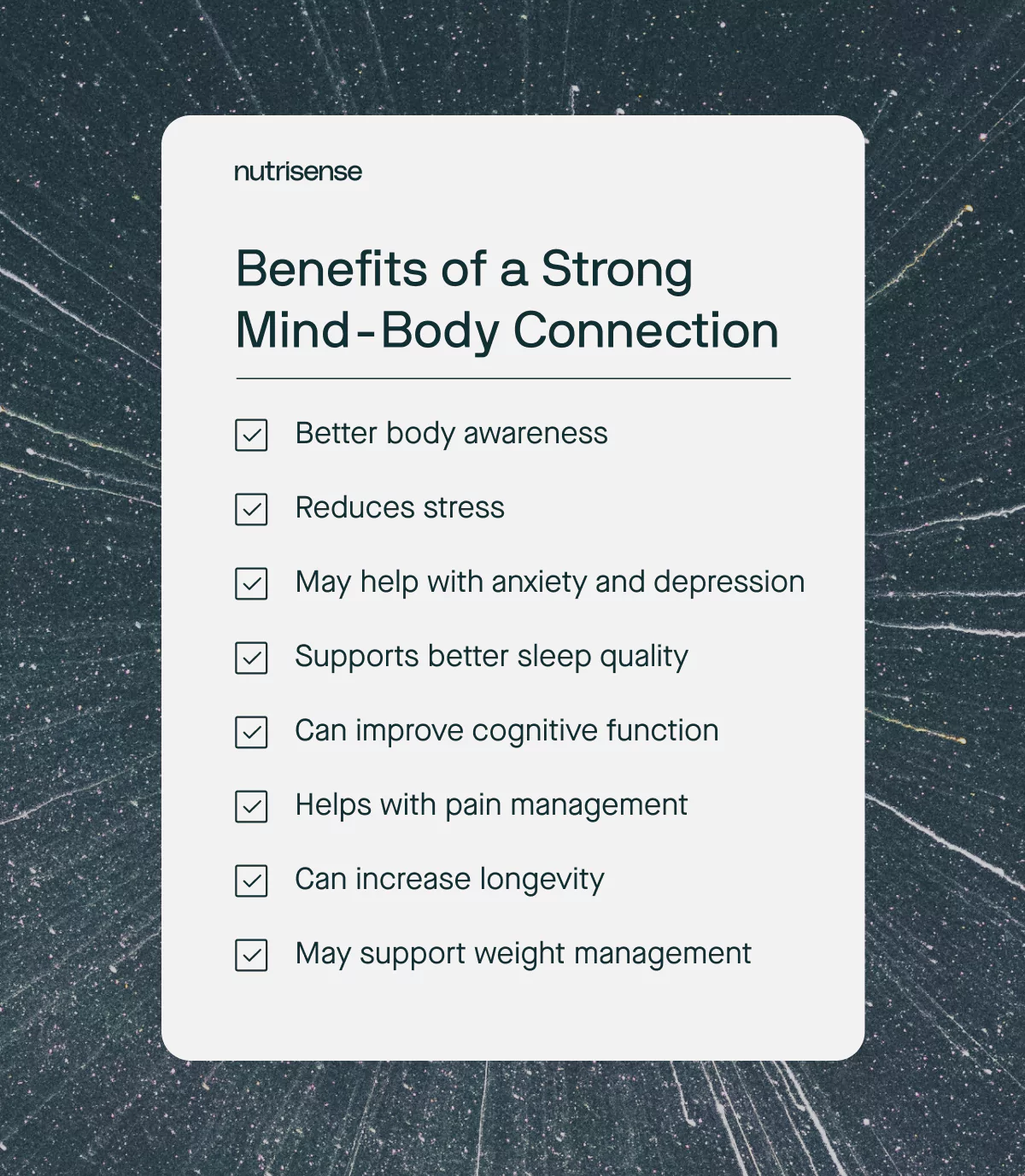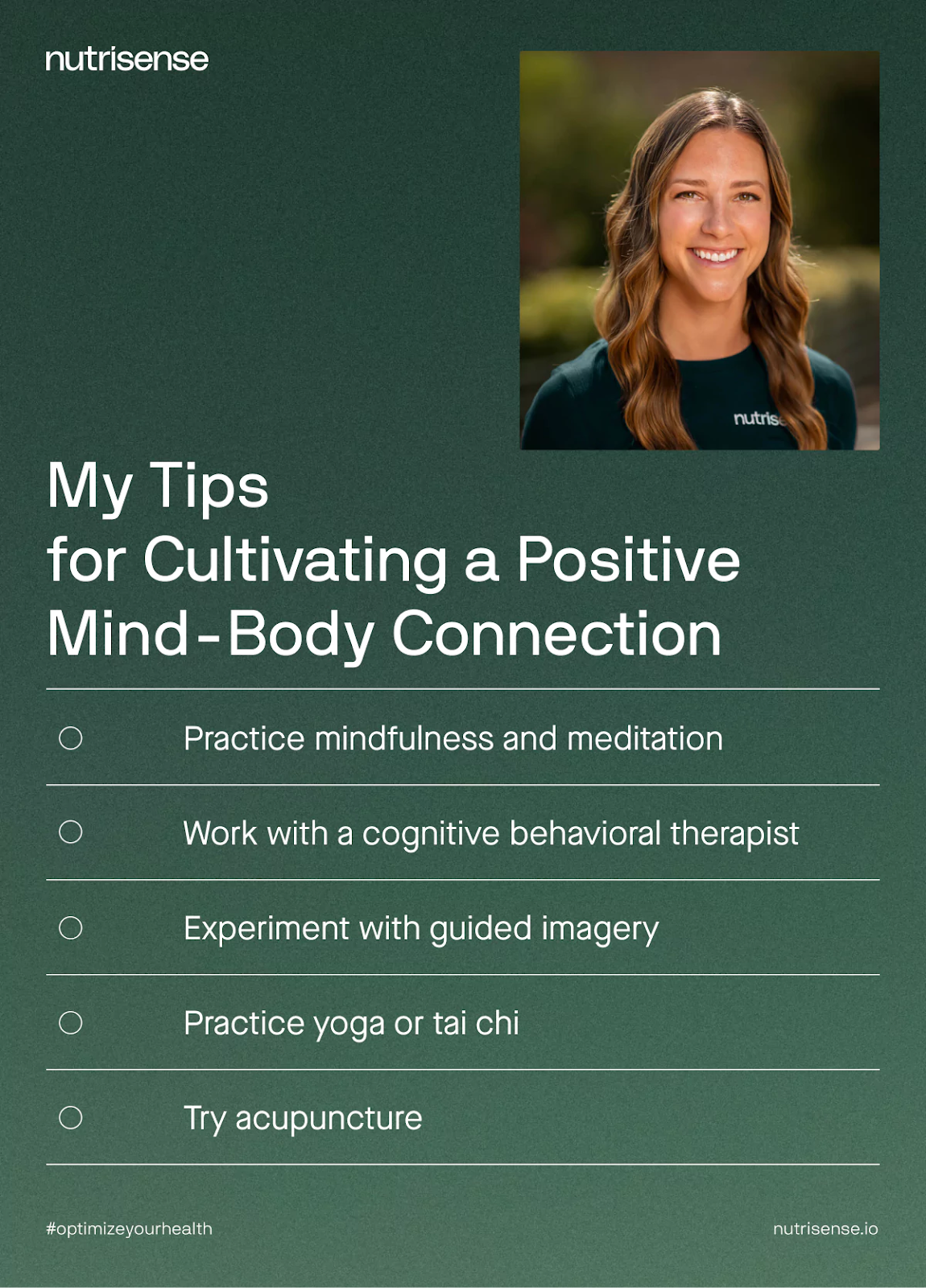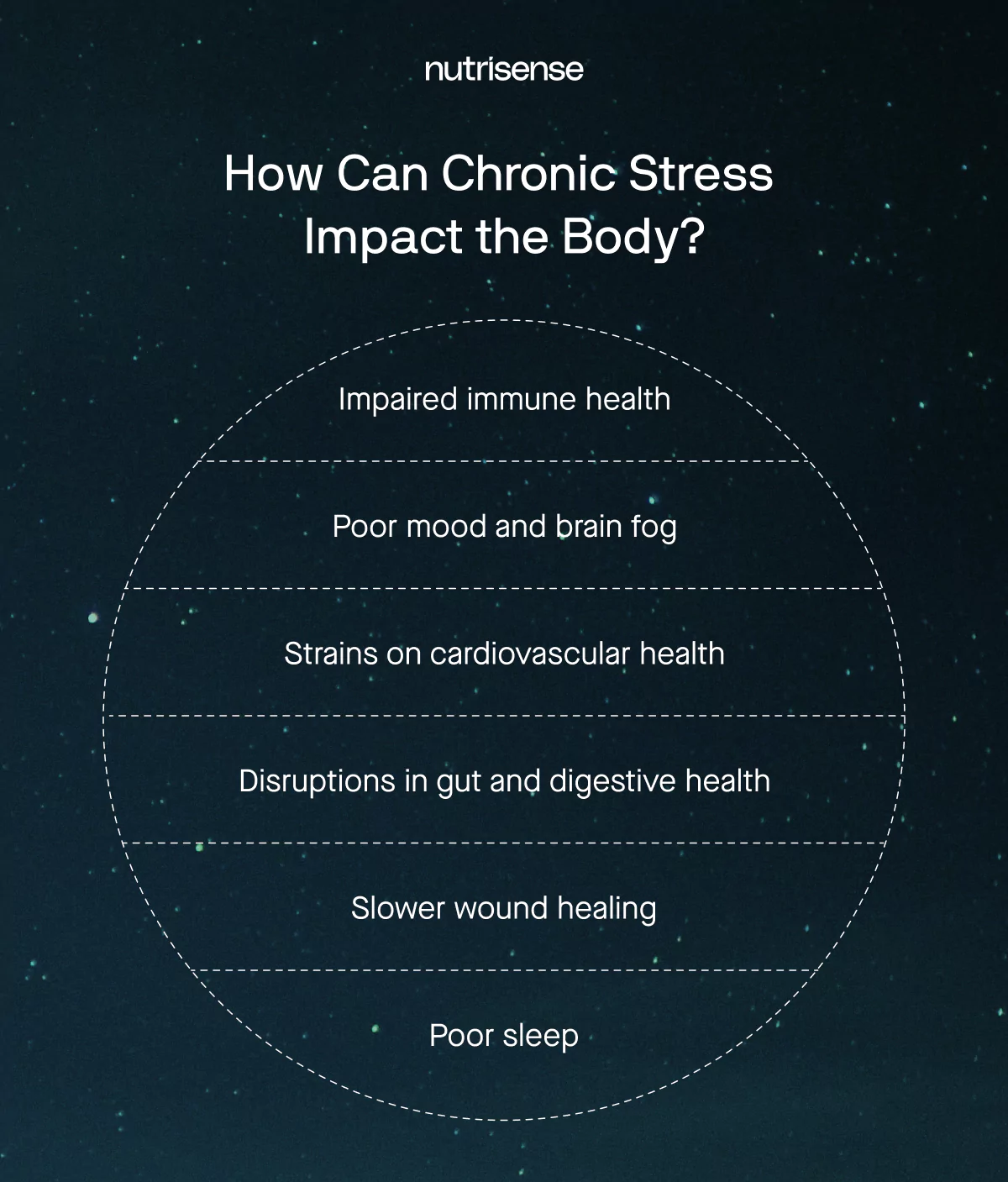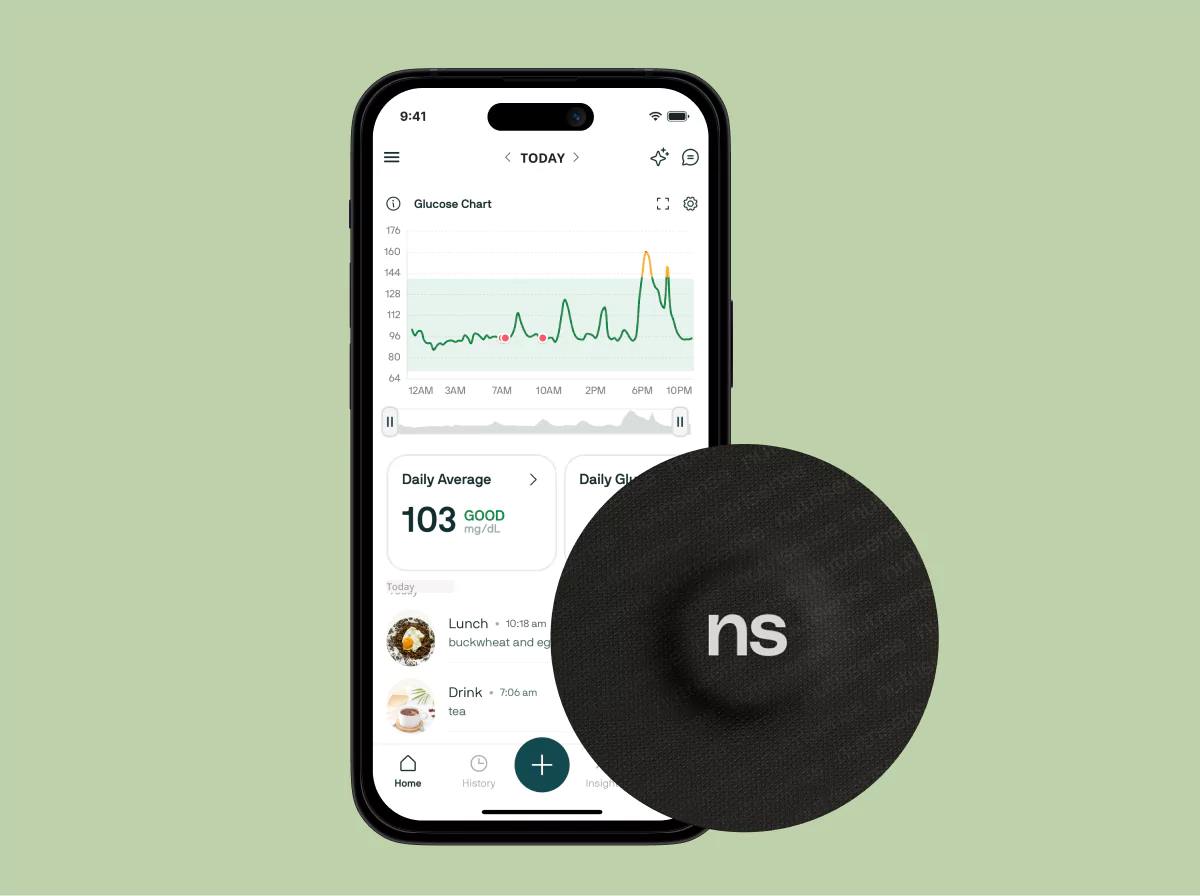The Mind-Body Connection: A Dietitian's Perspective for Optimal Well-Being

Key Takeaways
The mind-body connection is the direct link between your mental and emotional state and your physical health. Chronic stress can elevate cortisol, which may disrupt glucose levels, increase cravings, and make weight management more difficult even with a healthy diet. Understanding this relationship is a foundational step toward achieving your wellness goals.
What to know:
- Chronic stress can impact health by disrupting sleep and promoting fat storage, while a diet rich in nutrients like antioxidants and omega-3s can support brain function.
- Discover dietitian-approved tips on this page to strengthen this connection, such as practicing mindfulness and tracking how your body responds to daily habits.
- The Nutrisense program provides 1:1 dietitian support to help you turn your body's data into actionable steps, and video calls are often covered by insurance; coverage varies by plan.
Stress, nutrition, and the mind-body connection
Growing up in a family where health was a priority, I’ve always been naturally drawn to the idea of fostering a harmonious relationship between what I eat and how I feel. Through my experiences, I've come to learn that health is a delicate balance, and being in tune with your body and aware of potential factors that may cause disruptions to this balance is essential.
What I see in practice
In my time working as a registered dietitian, I’ve encountered a recurring theme among my patients that can significantly affect this balance - stress. For many, stress was the primary obstacle to achieving their health goals, and addressing it was often more crucial than focusing solely on nutrition.
Without finding the root cause of chronic stress, progress often would seem elusive, and the people I worked with would struggle to make sustainable changes in their lives. It became clear to me that achieving optimal health requires not only a balanced diet but also a deep understanding of the intricate ways our thoughts and emotions influence our physical well-being.
This insight has become the foundation of my work, and I’ve begun to infuse the principles of the mind-body connection into my professional life as well as my personal life to help others adopt a more holistic approach to wellness and feel more connected to their bodies.
When it comes to our health, the mind is a powerful thing, and it coexists with physical health. I truly believe that by using mind-body practices and the help of modern technology, we can strengthen this connection - promoting not just nutritional balance but also mental resilience and better health outcomes.
What is the science behind the mind-body connection?

The concept of the mind-body connection has existed for centuries. It forms the cornerstone of mind-body medicine, which is a field that asserts that our mental state has a profound influence on our physical health.
Did you know that in ancient Greece, the philosopher Hippocrates took a holistic approach to medicine, believing that the mind, body, and environment were interconnected and influenced health outcomes?
While the exact mechanisms that underlie these health-promoting effects are still a subject of ongoing research, this concept has become integral to various approaches in healthcare fields like:
- Integrative medicine
- Mindfulness-based practices
- Psychoneuroimmunology
- Behavioral medicine
But what is the science behind this relationship between physical and emotional health? That’s what I sought to discover: the more I learned about the mind-body connection and the impact it can have on so many aspects of our health.
Several key neurotransmitters and hormones play crucial roles - here are just a few examples:
Core Neurotransmitters
- Serotonin: Often referred to as the "feel-good" neurotransmitter, serotonin is involved in regulating mood, emotions, and sleep. Imbalances in serotonin levels are associated with conditions like depression, anxiety, and gastrointestinal issues.
- Dopamine: Dopamine is a neurotransmitter involved in feelings of pleasure, motivation, and reward. Imbalances in dopamine are associated with conditions like Parkinson's disease, schizophrenia, and addiction.
- Endorphins: Endorphins are natural painkillers produced by the body. They are released in response to stress and pain, providing a sense of euphoria. Exercise, laughter, and other pleasurable activities trigger the release of endorphins.
- Oxytocin: Oxytocin is released during social bonding activities, such as hugging, cuddling, or breastfeeding.
- Cortisol: Known as the "stress hormone," cortisol is released in response to stress. It helps regulate various bodily functions, though chronic elevation of cortisol can lead to negative health effects.
These are just some of the neurotransmitters and hormones that collectively contribute to the mind-body relationship. Understanding and addressing any imbalances is a key aspect of mind-body medicine and holistic approaches to health and well-being.
Why is the Mind-Body Connection Important?

Being aware of the mind-body connection has been a game-changer in my journey as a dietitian. I've witnessed firsthand how addressing the mind-body connection can be a catalyst for transformative change. For me, one truth has become clear: the relationship between our mind and our body is at the heart of our well-being.
How stress shows up in the body
A common example of the mind-body connection is the way psychological stress affects our bodies. As I mentioned, chronic stress triggers elevated cortisol levels, which, in turn, can disrupt metabolism and appetite regulation.
I’ve worked with several clients who have struggled with weight management, and despite their dedication to a balanced diet and exercise routine, progress often seems to stall. There was one woman in particular who had been grappling with her weight for years, finding it hard to keep the pounds off no matter how much progress she made.
Finding the real barrier
When we looked closer into her lifestyle habits and daily routine, we discovered that excess stress was likely the culprit. Some stress is good, but there is a finite amount of stress our bodies can handle, and women tend to have a lower stress threshold in general, as our bodies are more sensitive to stress load biologically.
In the case of this client, the relentless demands of work and life had created a toxic cycle that was affecting not only her emotional state but her physical health as well. She was determined to take back control and began strengthening her mind-body connection.
What changed over time
As her dietitian, I worked with her to create a diet plan suited to her needs, and we also implemented mindfulness practices such as meditation and yoga into her routine to heed the subtle signals her body was sending. She began to recognize that nurturing her mind was just as vital as tending to her physical well-being.
Over time, the grip of stress began to loosen as she implemented these healthy habits - and so did the extra pounds. It wasn't an overnight solution, but this gradual shift enabled her to reclaim control over her health. And this isn’t just anecdotal–researchers have observed that these techniques may often be a helpful factor in a comprehensive weight loss strategy, too.
Using data to stay aware
Understanding this connection through my own experience has also enabled me to empower clients with tools like continuous glucose monitors (CGMs) and fitness trackers that can help us be more in tune with our bodies. These technologies provide valuable insights into how our lifestyle habits impact metrics such as glucose levels and can help us make more informed decisions about diet, exercise, and stress management techniques.
9 Benefits of Deepening Your Mind-Body Connection

Regardless of your health goals, I believe that being in tune with your body is important for a myriad of reasons. Here are just a few of the key advantages of fostering a positive mind-body connection for your health:
1) Can Create Better Body Awareness
When you are aware of how physical symptoms can manifest from your mental state and are more in tune with your body cues, you’re empowered to actually do something about it. You can identify your stress before it becomes a problem and take note of abnormal symptoms before they manifest into something more.
2) Reduced Feelings of Stress
A positive mind-body connection can promote relaxation and reduce the production of stress hormones like cortisol. We have research that shows that chronically increased levels of stress can have serious effects on your health, including contributing to cardiovascular disease and gastrointestinal complications.
When I start to feel stressed, I find that getting outside and moving my body – whether it’s a hike or just a walk around the neighborhood–is a great way to help me reduce my stress levels and feel more relaxed.
3) Can Help With Feelings of Anxiety and Depression
Research has shown that health approaches emphasizing the mind-body connection can be effective in reducing anxiety and depression. These practices can foster a sense of calm and resilience, increase self-care, and offer powerful tools to manage stressors and navigate challenging emotions.
4) May Boost Your Immune System
A positive mind-body connection may also play an important role in bolstering the immune system, contributing to better overall health. Mind-body health approaches have been shown to potentially benefit the immune system by reducing markers of inflammation and positively affecting immunoglobulin A, a blood protein that contributes to increased immunity.
5) Can Lead to Better Sleep Quality
A positive mind-body connection may contribute to improved sleep patterns. Practices that nurture our mind-body connection can calm the mind, alleviate racing thoughts, and increase relaxation, which can pave the way for improved sleep quality and overall wellness.
When my mind is racing and I’m having a tough time falling asleep, I’ve found that doing a few minutes of stretching or yoga before bed or journaling can help me ground myself, release my subconscious thoughts, and get into a more relaxed state.
6) Improved Cognitive Function

A positive mind-body connection may enhance cognitive functions like concentration, memory, and overall mental performance. Mind-body practices have been shown to benefit the cognitive areas of learning, memory, language, executive function, and visuospatial ability.
7) May Help with Pain Management
Mind-body health approaches have been shown to benefit pain management. Mindfulness, for example, may reduce pain intensity and pain-related distress in people with chronic pain.
8) May Increase Your Life Expectancy
Studies have demonstrated a strong association between a positive mind-body connection and a longer lifespan. Combining mind-body exercises with healthy nutrition and lifestyle choices can support healthy aging and overall health.
9) Can Support Weight Management
A positive mind-body relationship may positively affect your relationship with food and facilitate progress towards weight loss goals. Research has shown that certain mind-body therapies can increase portion awareness, self-monitoring, satiation awareness, and stress reduction - all of which can benefit weight management.
When I feel more in tune with my body, I find myself to be more mindful when it comes to my diet and eating habits, meaning that I’m more likely to listen to my hunger cues and avoid overeating or eating foods that make me feel sluggish.
Tips for a Positive Mind-Body Connection from a Registered Dietitian

One of the most alarming takeaways I’ve had over the last several years as a registered dietitian is that the feeling "abnormal" has become so normalized that many people don't even recognize that something is off. To truly thrive, I believe it’s important to be conscious of both your mental state and your physical health to regulate your stress response system.
So, what mind-body practices can support this connection, and how can you incorporate them into your routine to reap the benefits? Here are a few lifestyle interventions I personally employ in my day-to-day life that I’ve found help me foster a positive mind-body connection and feel more in tune with my body.
Keep a Log of Your Body’s Signals
The first step to being more aware of your body signals is to keep track of them over time. Whether that's through journaling how you feel throughout the day or wearing trackers that can help increase your awareness, there are lots of ways to do this.
Find the one that works for you and take note of what your body is trying to tell you. Continuous glucose monitors, fitness trackers, or heart rate variability trackers are a few tools that can provide deeper insight into how your body is responding to your daily habits.
Food-Mood Diary and Bio-Individuality: Track, See, and Act
A food-mood diary connects what you eat, how you feel, and what your data shows, so patterns are easier to see and act on. Drawing from nutritional psychology and the psychophysiology of eating, include context like stress, pace, and thoughts.
Keep the tone non-judgmental, aim for nourishment over punishment, and build self-trust as you learn what works for you.
As one of our members shares: “Having her as a kind accountability partner has made a difference for me.”
Try it for 7 days
- Before you eat: note hunger 0 to 10, stress 0 to 10, one emotion word, and your intention for the meal.
- During: pace the meal (slow, medium, fast), mark distractions (phone, TV, none), and add one mindful breath check-in.
- What you ate: list the protein, fiber, fat, and mark processing level (minimally processed or ultra-processed).
- Two hours after: track energy 0 to 10, mood word, focus, cravings, comfort, and digestion. Add sleep quality that night, 0 to 10.
- Optional data: if you use a CGM, log glucose measured in interstitial fluid trends in the Nutrisense App, noting rise, peak, and time to return toward baseline.
- Bring your notes to an insurance-covered video call with a registered dietitian to translate patterns into simple steps that fit your life.
What to notice
- How meals with a protein plus fiber base feel compared with more ultra-processed options?
- Differences between earlier versus later eating, and slower versus faster meals.
- The impact of stress and sleep on mood, cravings, focus, and your 24/7 CGM patterns if you use one.
- Bio-individuality is the point here. You are mapping what nourishes you, not chasing perfection.
Practice Mindfulness and Meditation
Mindfulness and meditation are powerful practices that deeply influence the mind-body connection. These practices can lead to a decrease in heart rate, lower blood pressure, and a reduction in stress hormone levels like cortisol. They can also stimulate the release of neurotransmitters like serotonin, which promote feelings of calm and well-being.
Work with a Cognitive-Behavioural Therapy Professional
Working with a cognitive behavioral therapy (CBT) professional can help emphasize the connection between thoughts, emotions, and behaviors. This can make it easier to identify deeper issues that may be leading to unwanted coping mechanisms.
Through structured sessions with a trained therapist, I’ve been able to recognize and challenge negative thought patterns and beliefs that may be contributing to emotional distress or physical symptoms.
Experiment with Guided Imagery
Experimenting with guided imagery can have a profound effect on the mind-body connection. This technique involves the use of vivid mental imagery to evoke a sensory experience and lower feelings of stress and anxiety.
Practice Yoga or Tai Chi

Yoga and tai chi are both ancient practices that center around deliberate, mindful movements and controlled breathing. These disciplines have been shown to reduce stress, increase overall quality of life, and even lead to behavioral changes that can positively impact physical health factors like heart disease.
Try Acupuncture
Acupuncture is an ancient practice that stimulates the central nervous system and encourages a state of deep relaxation and triggers a release of endorphins. This not only alleviates physical discomfort but also leads to a sense of mental calm and may encourage a stronger mind-body connection.
How Does Stress Impact Your Health
Your mental state can have a powerful influence on your physical health, with both positive and negative effects. One of the most significant contributors to this dynamic is stress.
When you experience chronic stress, it can set off a cascade of physiological responses that can have detrimental effects on various aspects of your health, including:

- The immune system
- Gut health
- Sleep patterns
- Mood and brain health
- Cardiovascular health
- Wound healing
Immune and Gut Impact
One of the most noticeable impacts of chronic stress is its suppressive effect on the immune system. It can also wreak havoc on the digestive system, leading to disruptions in gut function that contribute to issues like irritable bowel syndrome (IBS), acid reflux, and other gastrointestinal disorders.
Understanding and managing stress is crucial for preserving immune function, supporting digestive health, and ensuring optimal healing and recovery. For this reason, practicing stress management can increase resilience, improve overall quality of life in the face of stressors, and even foster a stronger mind-body connection.
How Can Data Strengthen the Mind-Body Connection

I've witnessed the transformative power of data in many aspects of health during my time as a registered dietitian. Objective data, particularly from tools like continuous glucose monitors (CGMs) and wearable fitness trackers, can offer invaluable insights into how our dietary choices directly impact our physical and mental well-being.
Having access to 24/7 data and correlating it with how you feel is like having a personalized roadmap to understanding your body's unique responses. This data can:
What the Data Can Do
- Empower you to make informed choices
- Lead to a deeper appreciation for the relationship between diet, mood, and vitality
- Help you understand the nuances of your unique body
- Support mindfulness and healthier habits
CGMs and Food Choices
I’ve found CGMs to be exceptional resources in this endeavor. The CGM provides continuous, 24/7 feedback on how different foods affect glucose levels, allowing you to make tailored dietary adjustments, eat more intuitively, and learn how to sustain these habits on your own.
Let these insights guide your next step. Choose actions that align with your mental and physical needs. I firmly believe that this kind of access to personalized health data can help you build a more intuitive and mindful approach to understanding your unique body and improving your well-being.
Find the right Nutrisense programto turn insight into progress.
FAQs about the mind-body connection and Nutrisense
Q1. How does the Nutrisense sensor measure glucose, and what will I see in the app?
A1. Sensors measure glucose in interstitial fluid with readings about every 15 minutes, giving 24/7 trends. In the app, you scan to sync, view patterns across the day, and compare responses after meals, activity, or sleep. This provides a continuous picture instead of a single finger stick snapshot.
Source: How it works
Q2. Can I use Nutrisense to explore how stress, sleep, or workouts relate to my glucose?
A2. Yes. You can log meals and exercise in the app and run simple experiments, such as adjusting meal timing or trying a relaxation session before dinner, then review your glucose patterns. Over multiple days, this helps you see how your routines line up with your patterns.
Source: Nutrisense App
Q3. Do I need a prescription to start, and how long does shipping take?
A3. Nutrisense uses over-the-counter sensors, so no prescription is needed. After signing up and registration, approval usually takes 1 to 2 days. Orders processed in 1 to 2 days and shipped to U.S. addresses, typically arriving in 3 to 5 business days.
Source: How it works
Q4. What support do dietitians provide if I want to work on stress, sleep, and eating routines?
A4. You can book 1:1 video calls with registered dietitians. Sessions use a structured framework to review your data, discuss meals, movement, sleep, and daily routines, and set practical next steps. Many insurance plans cover calls. You can check eligibility online in minutes.
Source: Nutritionist video calls
Q5. Does Nutrisense diagnose or treat mental health or medical conditions?
A5. No. Nutrisense focuses on healthy lifestyle support, including nutrition guidance and data review, and does not diagnose, cure, mitigate, prevent, or treat any disease or medical condition. If you need medical advice or treatment, consult your healthcare provider. You can review our terms and usage policies for details.
Source: Terms of Service
Go Beyond Glucose Data with Nutrisense
Your glucose can significantly impact how your body feels and functions. That’s why stable levels are an important factor in supporting overall wellbeing. But viewing glucose isn't enough. Nutrisense, you’ll be able to learn how to use your body's data to make informed lifestyle choices that support healthy living.
One-to-one coaching
Sign up to access insurance-covered video calls to work with a glucose expert: a personal registered dietitian or certified nutritionist who will help tailor your lifestyle and diet to your goals.
Monitor and measure what matters
With the Nutrisense CGM Program, you can monitor your glucose with health tech like glucose biosensors and continuous glucose monitor (CGM)s, and analyze the trends over time with the Nutrisense App. This will help you make the most informed choices about the foods you consume and their impact on your health.
Find your best fit
Ready to take the first step? Start with our quiz to find the right Nutrisense program to help you take control.
Go Beyond Glucose Data with Nutrisense
Your glucose can significantly impact how your body feels and functions. That’s why stable levels are an important factor in supporting overall wellbeing. But viewing glucose isn't enough. With Nutrisense, you’ll be able to learn how to use your body's data to make informed lifestyle choices that support healthy living.
Work With a Dietitian
Sign up to access insurance-covered video calls with a glucose expert: a personal registered dietitian or certified nutritionist who will help tailor your lifestyle and diet to your goals.
Track Glucose In-App
With the Nutrisense Program, you can monitor your glucose with health tech like glucose biosensors and continuous glucose monitors (CGMs), and analyze the trends over time with the Nutrisense App. This will help you make the most informed choices about the foods you consume and their impact on your health.
Start With the Quiz
Ready to take the first step? Take our quiz to find the right Nutrisense program to help you take control.

Jordyn has a bachelor’s degree in biology, a graduate degree in Human Nutrition and completed a dietetic internship at the Memphis VA. She's a dietitian at Nutrisense, and has experience working as a clinical dietitian at a VA medical center specializing in oncology and at the Mayo Clinic, working with a wide range of patients ranging from neonates in the NICU to adult ICU.


.webp)

